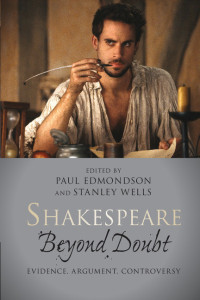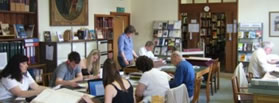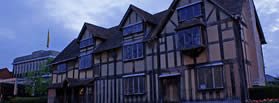She writes that I do not ‘directly confront’ what she calls her ‘single strongest argument … the comparative analysis of documentary evidence supporting the biographies of Shakespeare and his contemporaries.’ My reason for not commenting on this impressively researched section is that I find it irrelevant to the discussion of the case that Shakespeare’s works were written by William Shakespeare of Stratford-upon-Avon. Of course writers (and others) leave only partial records of their activities. The fact that some leave fuller records than others does not invalidate the records of those with a lower score.
Price claims that ‘none of the evidence that survives for Shakespeare can support the statement that he was a writer by vocation.’ On the contrary, this statement is supported by numerous records whose validity Professor Price denies, fallaciously in my view. Some of these do not link Shakespeare with Stratford, some, such as the Stratford monument and epitaphs, along with Dugdale’s identification of the monument as a memorial to ‘Shakespeare the poet’, Jonson’s elegy, and others, do offer this support.
I do not agree (whatever ‘historians and critics’ may say) that posthumous evidence ‘does not carry the same weight as contemporaneous evidence.’ If we took that to its logical extreme we should not believe that anyone had ever died. Most relevant here perhaps are the records of Marlowe’s death and burial. To deny, or even to question the validity of such documents is to fly in the face of the documented historical record.
Professor Price gives several reasons for downplaying the Basse elegy. One is that its authorship has been questioned. This is true but irrelevant. Someone unquestionably wrote it, and in time for Jonson to cite it in his Folio verses. Price says ‘the poem contains no evidence that the author was personally acquainted with Shakespeare.’ Again, true but irrelevant. It seems likely that many of the poets who mourned the death of Prince Henry in 1612 were not personally acquainted with him but that fact does not cause me to suspect that he was not the man the authors said he was. And whether one manuscript title ‘represents the original’ is irrelevant to the content of these titles.
Price writes that ‘Shakespeare is the only alleged writer of consequence from the time period for whom he [we?] must rely on posthumous evidence’ to prove that Shakespeare the writer was the man from Stratford.’ So far as documentary evidence goes this is true, but as I have said I see no justification for discounting posthumous evidence. Absence of evidence is not evidence of absence.
The question of the literacy of Shakespeare’s household is a red herring. Just as ‘good wombs have borne bad sons’ (The Tempest, 1.2.119), so great writers may have illiterate offspring. In any case I reiterate that Price ignores the evidence that Susanna, married to a distinguished physician, was ‘witty above her sex’ and irrelevantly claims that she had bad handwriting. I also have bad handwriting. Price defends her attitude by saying ‘one cannot prove a negative case.’ Why not? It is surely possible to prove that for example Queen Elizabeth 1 was not alive in 1604 or that Sir Philip Sidney did not write King Lear or that Professor Price does not believe that Shakespeare of Stratford wrote Shakespeare.
Professor Price, like many of Shakespeare’s more orthodox biographers, relies far too much on what seems to her to be the evidence of common sense – because she finds it difficult to imagine something it cannot be true; something must be true because the writer cannot imagine otherwise. Such an attitude results in the distortion of historical facts to suit the preconceptions of the writer.






